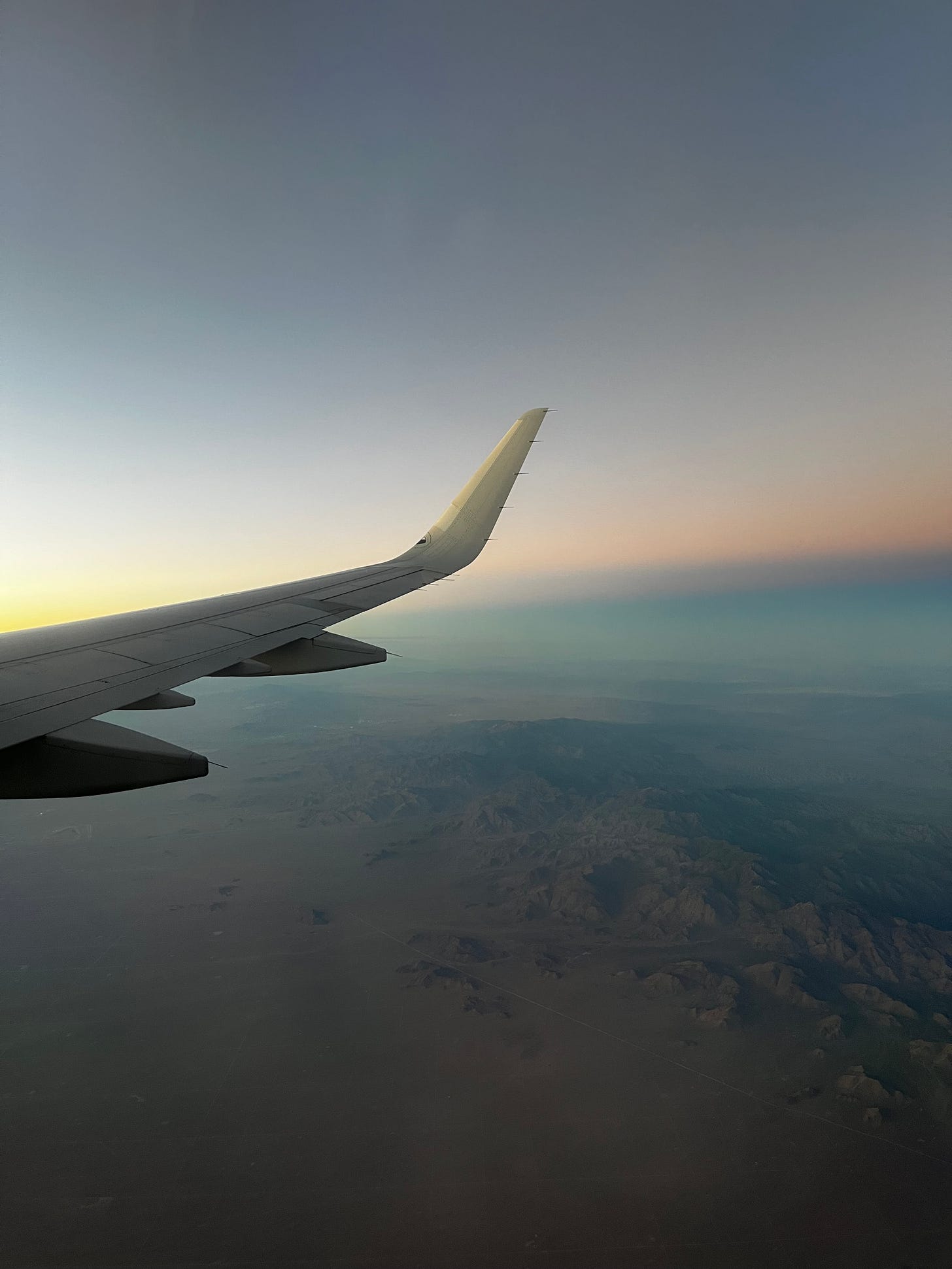Q&A With an Airline Pilot: Work-Life Balance, Safety, and Misconceptions
Avation safety is at the center of the cultural conversation — here's what it's really like to be an airline pilot in 2025.
Hi friends! This week’s newsletter is pretty long, so I encourage you to head on over to the Substack app for a better reading experience (and where you can “like” and “comment. Thanks for reading!)
I first met Johnathon S. when I was a freshman in college. He was the RA on my boyfriend’s floor, and we’ve kept in touch over since school, largely through social media.
Johnathon and I have something in common — after graduation, we both joined the travel industry (I went into travel journalism, while he became a pilot at a major U.S. airline).
Over the last few weeks, a series of plane crashes, along with the mass layoffs of hundreds of Federal Aviation Administration (FAA) employees has resulted in a decline in public confidence in aviation.
I’m a frequent flyer for my job, so I wanted to ask Johnathon: What do we need to know right now about aviation safety? And, also, what the heck is it like to be a pilot right now? And how do you balance the stress of the job, while maintaining a personal life? And, how do you keep your skills sharp? (I’m a journalist after all, so I have a lot of questions. :)
Here’s what I learned.
(Note: Johnathon has asked that his last name and company be kept private, so we will refer to him by his first name and last initial).
Q: Given recent discussions about air safety, what would you say to passengers who may feel nervous about flying right now?
A: While it may be an overused saying, “The numbers speak for themselves.”
You are at far greater risk getting into your car on any given day than you ever will be getting onto an airplane. The song “Dirty Laundry” by Don Henley often comes to mind:
“We got the bubble-headed bleached-blonde, comes on at five.
She can tell you 'bout the plane crash with a gleam in her eye. It's interesting when people die, give us dirty laundry.”
However, we are living in the safest period in modern aviation. EVER! There were 0 fatalities by U.S. airlines from 2009-2025. Hopefully the next stretch is even longer. It is truly remarkable when you think of how many planes take off and land every single day.
Q: How about when it comes to aspects of flying that tend to cause people anxiety, such as turbulence?
A: I often try and relate turbulence to being on a boat. While we can’t see the turbulence visually with our eyes, it is often similar to waves crashing into a boat. The airplane is designed to withstand any turbulence encountered and bigger planes are better at withstanding stronger turbulence, much like a cruise ship is more stable than a speed boat. The front of the aircraft is also smoother than the back of the airplane, much like riding in the front of the bus than the back of the bus. Try and sit as close to the front of the aircraft as possible to get the smoothest ride. Technology has improved predicting when rides will be most turbulent, but it is still not an exact science. So always respect the seat belt sign.
Flight attendants receive yearly training, just like pilots, to ensure they are proficient in dealing with emergency situations. They are very observant of all passengers and are valuable resources. If the flight attendants are told to take/remain in their jump seats then that is a very good indicator it is not safe for you (or the people around you) to be moving about the cabin.
If you’re feeling panicky/scared while in flight don’t be afraid to verbalize that to a flight attendant. Open your air vent, ask for a glass/bottle of water, and try and focus on your breathing. Prepare your phone or tablet with preloaded content (we all know how unreliable WiFi can be when traveling in a metal tube at 500 mph)! And ultimately remember… flying is one of the coolest things mankind has ever been able to do! What an amazing and unique experience that you get to partake in (while most of human history could only dream of).
Q: What are the most challenging aspects of your job, both in the cockpit and in balancing your schedule with your personal life?
A: I often say pilots are not paid well for the “easy” days. A normal flight with great weather and zero mechanical issues can often feel like you have the easiest job in the world. And you are paid incredibly well to do it.
But, it’s the days when things are not going well that you truly earn your paycheck. It’s not good enough to be 70% good at your job. You have to bring your very best each and every time you are at the controls. People’s lives are in your hands. That can add a lot of stress into your life.
Finding hobbies outside of aviation has really helped me. It’s very easy to leave work at the airport (unfortunately, the company won’t lend me a multi-million dollar jet for the week), so it’s best to turn off the pilot brain and focus on my personal life. I find that those who don’t get away from aviation are the most upset with their jobs, because they are stuck focusing on then negatives. Talking to non-aviation friends and family at parties is the best reminder that I have the best job in the world. (And they are very happy to remind me.)
“It’s not good enough to be 70% good at your job. You have to bring your very best each and every time you are at the controls.”
Q: Related to this, how do you manage work-life balance with an unpredictable schedule, and time away from home?
A: I have a partner who is very understanding with regard to the demands of the schedule. She’s in healthcare, so we try not and focus too much on the specific day a holiday may fall on, but instead celebrate when we can be together.
I am often reminded that my passengers are going to see loved ones for the first time (or the last time), attending important business meetings, doctors doing an important surgery, etc. So while I might not be home, I’m helping others get to where they need to be.

Q: What’s one moment in your career that really stands out— whether it was inspiring, stressful, or rewarding?
A: I worked as a captain throughout all of the COVID-19 pandemic. There were times when I questioned if my occupation was genuinely making the spread of COVID-19 worse throughout the world. But when I flew airplanes with only 3, 4, 8, or 9 people on board, I knew that they themselves had a very specific reason to be traveling. Seeing a loved one for the last time. A doctor going to help an overwhelmed hospital. It eased my mind that I was still doing an important job that required my expertise.
“But when I flew airplanes with only 3, 4, 8, or 9 people on board, I knew that they themselves had a very specific reason to be traveling. Seeing a loved one for the last time. A doctor going to help an overwhelmed hospital. It eased my mind that I was still doing an important job that required my expertise.”
Q: How do pilots stay sharp and continuously improve their skills, even after years of flying?
A: Every U.S. airlines pilot does rigorous simulator testing every year (my airline requires every 9 months) to prove that their skills are still up to standards. Engine fires, failures, weather events. Many things you often will never experience in a real airplane are reviewed and tested at these events.
Talking to other crew members’ experience and learning from your own events is also extremely helpful in making the very best pilots. I hope to never stop learning.
Q: What advice would you give to someone who wants to become a pilot?
A: There are many events in general aviation (small airplanes) at your local airport that one can attend to see if they are even interested in becoming a pilot. An intro flight in a small airplane is such an incredible experience. Reach out to your local airport to see what’s available. If you fall in love with it, as I did, do everything you can to gain more experience.
Unfortunately, it can be an expensive endeavor when going through training. But it can be extremely rewarding in experience and financially if you decide to pursue a career in the field. And then, do everything you can to stand out in the field.
“It is incredible. I still get a thrill when I advance the thrust levers for takeoff. I don’t think that will ever go away.”
Q: If there was one thing you wish more people understood about flying and pilots, what would it be?
Flying is still a very new form of travel in modern human history. And yet it has allowed for humans to reach all ends of the Earth. It is incredible. I still get a thrill when I advance the thrust levers for takeoff. I don’t think that will ever go away. Many pilots will tell you the same feeling. COVID-19 was an important reminder of how important travel is to humans. It’s one thing seeing a place on your phone… it’s another to experience it person!
I’ll leave you with this quote:
“A mile of highway will take you just one mile. A mile of runway will take you anywhere.” -Unknown
(It’s Emma now): I want to give a huge thank you to Johnathon for sharing his experience. Coincidentally, I just hopped off a flight, and currently in Europe for a river cruise conference.
See you back here (and in the U.S.) next week!
Best,
Emma Stern






This was a really nice reminder of all the things I know in the back of my brain but that I forget when the news keeps focusing on the bad things that happen in aviation. Thanks to J for the insight and encouragement :)
Needed this!